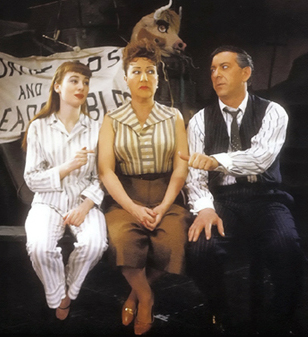Stew's Passing Strange Is Perfectly Seasoned

Photo: Carol Rosegg
(left to right): 1. Chad Goodridge, Daniel Breaker, Colman Domingo, Stew and Rebecca Naomi Jones
Reviewed by Tony Vellela
Passing Strange, at
the Belasco, cannot be neatly categorized, its story cannot be easily
encapsulated, and its energy cannot be remotely contained. Its title is lifted from Othello, another classic that involves the tortured journey
of a Black man trying to live at odds with his identity.
Here are some of the reasons why Passing Strange is the Best Musical of the 2007-2008
season ...
It's not really a musical. It's a lyric rap-inspired coming-of-age performance poem set
to a dazzling array of musical styles.
It's not the conventional 'coming-of-age' story. Writer Stew takes his personal journey,
that stretches back a few decades, lays it out in nostalgic detail, then slaps
you in the face with its universal relevance.
You can hear it.
As Stew relates this indictment of modern hypocritical society with an
intelligence rarely heard in musical theatre, the audio component of the
performance is calibrated so carefully that it actually allows you to
comprehend what is being said and spoken.
Kudos to sound designer Tom Morse.
Your imagination is permitted to use itself — not in the
'back wall painted black' style, or the' three chairs and a light bulb' style,
but in the style of the most stimulating Expressionist paintings come to life.
It's genuinely emotional. The stripped-down basics of this person's formative years,
fleeing from an upper middle class African-American Los Angeles suburb to Amsterdam and then Berlin during the
post-hippie [1978] era challenges
the cynical, mocks the self-indulgent pseudo-sophisticate and inspires the
innocent. As Youth, the central
character stand-in for Stew, adopts Zen Buddhist attitudes and angst-driven
lost artist zeal, he embraces whatever happens to him or whoever happens to
come to him, all the while seeking to catch the previous decade's spirit to Do
Your Own Thing. From The Glass
Menagerie to The Fantasticks, the coming-of-age journeys that have endured are
the ones that anyone can relate to, despite the specifics. Youth is this generation's stage
version of Francois Truffaut's
Antoine Doinel. In
this stunning case, Stew selectively pulls from his own CV of creative
acts, and guides us through the
experiences and their interpretations as deftly as Thornton Wilder's Stage
Manager. This usually mishandled
device succeeds here because we see him doing it to his younger self, and he
lets us in on it, mistakes and all.
It's as poignant as Little Edie in the second act of Grey Gardens;
telling us about the grim emptiness and emotional exhaustion of another winter
in a summer town.
And since this is a musical, it must be emphasized that the
musical elements [lyrics by Stew, and the composing shared with Heidi
Rodewald], which flows effortlessly
and naturally from gospel, rock, rap and soul to jazz, funk and punk, is
amazing. Period.
When The Beatles released their animated feature Yellow
Submarine in 1968, a popular parlor game
(often chemically-enhanced) involved listing the acid-inspired sight gags and
the visual non-sequiturs, missing the "whole" point — the synergy that all the
parts resulted in a unified experience.
So, yes, Stew manages to weave in unobtrusively people as diverse as
James Brown, Picasso, Fred Astaire, Josephine Baker, Fellini, Hendricks, Camus,
Hegel and James Baldwin, as well as My Fair Lady, The Wizard of Oz, Cabaret,
and Bach fugues. But the whole is
a live stage experience similar to the culinary version of its key creator's
name — a savory theatrical stew of sounds, sights, thoughts, moves, and most of
all — words. Stew's book and
lyrics rise above anything else Broadway presents eight times a week. He reports on the times when "You can
trip all day till your mind just melts; makes Berkeley look like the Bible
Belt." He chuckles recalling that
"Molotov cocktails cops could handle; but performance art scared them to
death." He confesses that "my pain
fucked my ego and I called the bastard art."
On March 31, 1943, the curtain went up on another revolutionary
musical. Instead of a big rousing
chorus number, an old woman sat alone on a prairie front porch, churning
butter. Oklahoma! broke a good many conventional Musicals' molds, and
with any luck at all, Passing Strange
will do the same. In case it doesn't,
make sure you catch this one, because it's not the 'strange' that should be of
concern, but the 'passing.'
PASSING STRANGE will perform Tuesdays at 7pm; Wednesdays - Saturdays at 8pm; Wednesday and Saturday matinees at 2pm; and Sundays at 3pm at the Belasco Theatre (111 West 44th Street) on Broadway. Tickets are priced $111.50 - $66.50 - $36.50 - $26.50, and are available through Tele-charge at www.TeleCharge.com, or by calling 212-239-6200. For additional information, visit www.PassingStrangeOnBroadway.com.
TONY VELLELA, the veteran theatre correspondent for The Christian Science Monitor, writes and produces the PBS series about theatre, "Character Studies" His work has also appeared in Parade, Theatre Week, USA Today, Dramatics, Rolling Stone, and several other publications.
Labels: Chad Goodridge, Colman Domingo, Daniel Breaker, Passing Strange on Broadway, Rebecca Naomi Jones, review, Stew Jones, Tony Vellela










